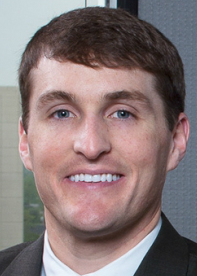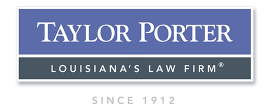Holy “Cap!” Health Care Providers Now Face Uncapped Exposure for Negligent Credentialing
November 14, 2017
Published in the November/December 2017 Issue of the Healthcare Journal of Baton Rouge
By Adam Thames
adam.thames@taylorporter.com
Partner, Taylor Porter
 LOUISIANA LAW IMPOSES on health care providers a duty to investigate, select, and retain only qualified and competent physicians to care for their patients. A provider’s liability and resulting exposure for breaching these obligations, sometimes categorized as negligent credentialing, has historically been “capped” by Louisiana law. Stated more specifically, a patient’s claim for negligent credentialing was considered to be inherently related to medical treatment and thus subject to the Louisiana Medical Malpractice Act (“LMMA”) - including most notably for health care providers, the limitations of liability, or “cap” on money damages, that a patient could recover in a lawsuit. The Louisiana Supreme Court, however, recently removed this layer of protection for health care providers in the landmark decision of Billeaudeau v. Opelousas Gen. Hosp. Auth., 2016-0846 (La. 10/19/16).
LOUISIANA LAW IMPOSES on health care providers a duty to investigate, select, and retain only qualified and competent physicians to care for their patients. A provider’s liability and resulting exposure for breaching these obligations, sometimes categorized as negligent credentialing, has historically been “capped” by Louisiana law. Stated more specifically, a patient’s claim for negligent credentialing was considered to be inherently related to medical treatment and thus subject to the Louisiana Medical Malpractice Act (“LMMA”) - including most notably for health care providers, the limitations of liability, or “cap” on money damages, that a patient could recover in a lawsuit. The Louisiana Supreme Court, however, recently removed this layer of protection for health care providers in the landmark decision of Billeaudeau v. Opelousas Gen. Hosp. Auth., 2016-0846 (La. 10/19/16).
In Billeaudeau, a patient sued an Emergency Department (“ED”) physician for allegedly failing to diagnose a stroke and timely administer tPA (tissue plasmingogen activator), causing her to suffer severe brain damage. In that same lawsuit, the patient also sued Opelousas General Hospital contending, among other claims, that the ED physician was not qualified to be credentialed under the hospital’s own policies and thus should not have been allowed to practice medicine in its ED. Both the trial court and the Third Circuit Court of Appeal found, over the objection of Opelousas General Hospital, that the patient’s negligent credentialing claim was not related to the delivery of health care by the ED physician and thus fell outside the scope of the LMMA.
In a surprising 4-3 decision, the Louisiana Supreme Court affirmed the decisions of the lower courts and found as a matter of law that a patient’s negligent credentialing claim against a health care provider was not subject to the LMMA. In the Court’s majority opinion, Justice Knoll explained that although “ … the staffing of a hospital does in some aspects involve the degree and quality of healthcare provided by a hospital, the decision to hire a physician in and of itself is administrative and does not directly relate to the treatment of any given patient or involve a dereliction of professional skill.” (Billeaudeau, at *8). Thus, the Court drew a clear distinction between a patient’s claim for negligent supervision of a physician, which does fall under the LMMA, and the initial decision of the health care provider to credential a physician, which the Court determined fell outside the LMMA. In a concurring opinion, Justice Weimer further found that negligent credentialing did not fall under the LMMA because it was not specifically included in the statute’s definition of malpractice. (Billeaudeau, at *15).
In reaching their decision, the majority in Billeaudeau failed to directly address prior decisions where Louisiana courts held that a claim for negligent credentialing fell squarely within the LMMA. Nevertheless, Billeaudeau is now controlling and therefore must be followed by lower courts that are confronted with claims of negligent credentialing. Only being a year removed from Billeaudeau, it is too early to gauge how our courts and legislature will confront the new landscape of uncapped negligent credentialing claims. However, there are practical ramifications of this ruling that are already affecting health care providers, including but not limited to: increased litigation fees, the potential for disclosure of confidential information, and disputes or gaps in insurance coverage for health care providers faced with this new exposure.
INCREASED LITIGATION FEES
Most obviously, health care providers should expect — and, in fact, are already seeing — an increase in negligent credentialing allegations in lawsuits brought by patients with underlying claims of medical malpractice. As a preliminary matter, it seems counterintuitive to litigate a negligent credentialing claim before the patient’s underlying complaint of medical malpractice against the physician concludes at the Panel stage. Because Billeaudeau found that these claims are not treatment-related, however, patients can arguably litigate the merits of the negligent credentialing allegations in state court while simultaneously pursuing the claims of medical malpractice before the PCF. This dual-track litigation will necessarily result in an increase in legal fees and expenses for health care providers facing the inevitable uptick in negligent credentialing lawsuits.
DISCLOSURE OF CONFIDENTIAL INFORMATION?
Perhaps more importantly, health care providers should expect patients to aggressively pursue information about its confidential credentialing policies and procedures. In most instances, the credentialing process is based on the decisions of a committee formed by the health care provider. Under Louisiana’s peer review statutes, La. R.S. 13:3715.3(A), decisions of a peer review committee, arguably including a credentialing committee, are privileged and not subject to disclosure. Further, under La. R.S. 40:2205, the records and proceedings of a hospital committee are confidential and not subject to court subpoena. While the peer review statute is primarily aimed at protecting information exchanged in association with the issuance or denial of privileges, a health care provider should be allowed to assert these peer review protections by analogy to significantly, if not wholly, limit evidence available to a patient asserting a negligent credentialing claim. Unfortunately, courts have not provided much guidance in this area, presumably because discovery on negligent credentialing was never a priority when the claim was capped under the LMMA.
Certainly, health care providers should take a hard line against producing in litigation any of its confidential protocols and procedures for credentialing. If a provider decides to waive a known privilege or if a court orders a provider to produce this credentialing information, there is no defined scope of what can, or should be, disclosed in an uncapped negligent credentialing lawsuit. A patient may be able to fashion a very strong argument that he or she is entitled to all of a provider’s internal policies and procedures for credentialing a physician, along with the committee’s file materials for the credentialed physician being sued for malpractice. However, it is unclear how much more information, if even any at all, a patient will be able to discover about a health care provider’s confidential and sensitive credentialing process.
The purpose of the peer review protections are, of course, to allow committee participants to speak candidly about the candidates and fully engage in the process. While likely not an intended result, Billeaudeau may have a chilling effect on the credentialing process if participants are no longer confident their work will remain confidential or if they are concerned with potentially being subject to a subpoena to testify under oath about their role in the credentialing of a certain physician. At a minimum, health care providers that disclose confidential information to a patient in a negligent credentialing claim — whether in response to a court order, voluntary waiver, or otherwise — should ensure that the information produced is subject to a strict protective order signed by the court and all parties and designed to survive the life of the litigation.
INSURANCE COVERAGE
Many professional liability policies insure damages caused by the failure of a physician to adhere to the acceptable standard of medical care, i.e. medical malpractice, yet specifically exclude coverage for other liability claims, like negligent credentialing. Given Billeadeau’s clear distinction between these two claims, health care providers should confirm they have adequate insurance coverage in place to protect against not only “capped” claims of professional negligence as defined by the LMMA but also their “uncapped” exposure for negligent credentialing. In light of Billeaudeau, many health care providers may also be faced with a drastic increase in insurance premiums for liability coverage designed to protect the insurer from this new risk. Thus, Billeaudeau’s financial impact on health care providers may extend well beyond the courtroom.
Proponents of Billeaudeau may contend that the Court’s opinion will incentivize health care providers and their physicians to take credentialing more seriously and ensure that only the best physicians are hired and maintained on staff. Opponents, however, could reasonably argue that Billeaudeau undoes years of court precedent and sound legislative policy and effectively creates a back-door for patients to circumvent Louisiana’s long-held constitutional cap on recovery of money damages for medical malpractice. Regardless, Billeaudeau is the most recent directive from our state’s highest court on a health care provider’s liability for negligent credentialing and short of a legislative amendment, this new landscape of uncapped liability is here to stay. Health care providers and those who sit on the committees formed to investigate, select and retain physicians must appreciate the seriousness of this ruling and be proactive in reviewing credentialing policies and procedures to ensure they are compliant, use caution in disclosing confidential information gathered during the credentialing process, and maintain adequate insurance to protect against this now-uncapped exposure.
If you require additional information about this article, would like a consult about a pending or threatened negligent credentialing claim, or wish to evaluate your credentialing policies and procedures, please contact me at adam.thames@taylorporter.com or 225.381.0272. You can learn more about our law firm’s health care legal services by visiting our Taylor Porter Health Care Practice Team web site page at:
https://www.taylorporter.com/practice-areas/health-care-regulation-and-litigation/
- Contributions in research made to this article by Taylor Porter attorney Ne’Shira Millender
About the Author Adam Thames: Adam Thames is a Partner at Taylor Porter and a member of the Firm’s Health Care Practice Team. He devotes a significant portion of his practice to representing physicians, hospitals, dialysis clinics, nurses, and other health care providers in medical malpractice and other professional liability claims. Adam also has extensive experience litigating class action, products liability, personal injury, and insurance defense claims. Adam is ranked by his peers among the 2017 Louisiana Super Lawyers’ “Rising Stars.” Within Taylor Porter, Adam serves as Chair of the firm’s Recruiting Committee.
You can view Adam’s profile at: https://www.taylorporter.com/our-attorneys/l-adam-thames
Read our Case Studies
See how we can help. Contact us today
- Disclaimer
- © Taylor, Porter, Brooks & Phillips L.L.P. All rights reserved.



